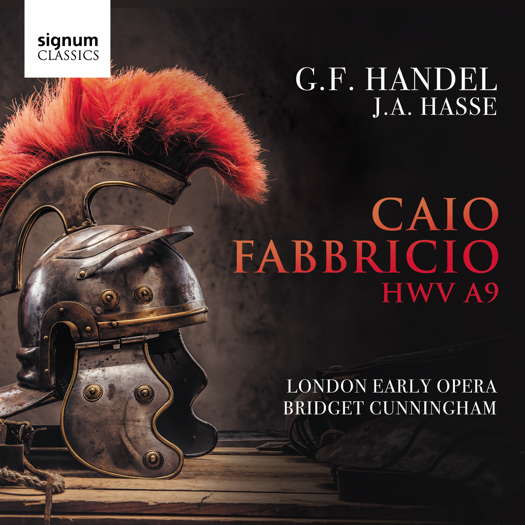- Max Herrmann
- Jean Sibelius
- Georg Katzer
- Villazon
- JoAnn Falletta
- David T Little
- Victoria BC
- University of Ottawa School of Music

Borrowing Music by Other Composers
GERALD FENECH unreservedly recommends the compilation opera 'Caio Fabbricio'
'... brilliant performances from both singers and players ...'
Caio Fabbricio is a 'pasticcio' opera - a 'compilation' opera containing a brilliant and well-considered collection of some of the finest eighteenth century Neapolitan arias by different composers - selected, arranged and assembled by Georg Friedrich Handel (1685-1759). In the first part of the eighteenth century, Handel played an important role in firmly establishing opera in London, through which he was able to introduce the music of Johann Adolph Hasse (1699-1783) to public attention by his endeavours as Master of the Orchestra of the Royal Academy of Music.
Despite being criticised for borrowing music by other composers, Handel chose to direct and perform nine 'pasticcio' operas with the Royal Academy rather than rely entirely on his own compositions. These 'pasticcios' contained music by composers who wrote in the modern, innovative Neapolitan lyrical style which was melody-led rather than driven by counterpoint. Among this group of composers one finds J A Hasse, fourteen years younger than Handel, who had been trained in Italy and quickly rose to become the most widely admired composer of opera seria in the middle decades of the eighteenth century. This new Neapolitan language, combined with Hasse's own contrapuntal working methods, forms the unique stylistic mixture that permeates his own later works.
Listen — Hasse: Sinfonia Concerto II in D, Op 4
(SIGCD713 CD1 track 1, 1:00-1:57) ℗ 2022 Signum Records Ltd:
Handel premiered Caio Fabbricio with the Royal Academy at the King's Theatre in London, after troubles of all sorts, on 4 December 1733. Although he had used several of Hasse's arias before, this was the first occasion he structured a 'pasticcio' performance around an entire Hasse opera. Indeed, Hasse had introduced his own Caio Fabbricio in Rome in January 1732, and Handel had acquired a songbook of the arias in it from his friend and favoured librettist Charles Jennens. This Handel used for his own version into which he introduced several substitute arias besides adding shorter more dramatic recitatives.
Listen — Handel, after Hasse: Figlia, Volusio (Caio Fabbricio)
(SIGCD713 CD1 track 6, 0:00-0:47) ℗ 2022 Signum Records Ltd:
Caio Fabbricio had even been set earlier in 1729 by Antonio Caldara in Vienna to a libretto by Apostolo Zeno, and it is this libretto, revised by Nicolo Coluzzi for Hasse's 1732 production, that Handel used for his own 'pasticcio'. The plot is based on the story of the incorruptible Roman ambassador 'Caio Fabbricio', who was sent from Rome to Taranto on the southern coast of Italy to restore peace and order between Rome and the Greeks under the leadership of the warlike king of Epirus and Macedonia, Pyrrhus (Pirro), in the wake of the latter's self-damaging 'Phyrric' victory in 280 BC. The figurative expression 'a Phyrric victory' stems from this short-lived victory, as the Greeks suffered immense losses and were weakened for years, before finally losing the Phyrric War.
Handel's 'pasticcio' operas have in the past been greatly neglected and undervalued. Now, thanks to London Early Opera, a UK charity that raised funds to digitize Handel's conducting score of Caio Fabbricio at the Staats-und-Unversitatsbibliothek, Hamburg, in 2019, we are in a position to evaluate afresh this operatic rarity, containing as it does Handel's expert selection of some of the best Neapolitan music available at the time. This pioneering performing edition, of which this is a world premiere recording, has been thoroughly researched, resulting in a full knowledge of the diverse provenance of its arias that builds on the work of such scholars as Hans Dieter Clausen, Reinhold Strohm, Raffaele Mellace and John Roberts.
Listen — Francesco Corselli: Figlia, Volusio (Venere placate)
(SIGCD713 CD2 track 3, 0:00-0:57) ℗ 2022 Signum Records Ltd:
Translated freely, the Italian word 'pasticcio' can be taken to mean a 'hotch-potch', but this score is light years away from this assumption. Indeed, the music has a dramatic potency that drives the action with verve and intensity, and both arias and recitatives perfectly capture not only the emotional expressiveness of the characters, but also the humane element of the story that is touching throughout.
Listen — Leonardo Leo: Vorrei da lacci sciogliere (Demetrio)
(SIGCD713 CD2 track 23, 4:14-5:10) ℗ 2022 Signum Records Ltd:
Bridget Cunningham, who is responsible for the preparation and editing of the modern score and parts, draws some brilliant performances from both singers and players, and her impeccable attention to detail brings to the fore all the shades and colours of this Handelian enterprise, which up till now, was unjustly ignored. Excellent sound and presentation complete a hugely important addition to the Handel catalogue which should not be missed, whatever the reason. Unreservedly recommended.
Copyright © 3 May 2022
Gerald Fenech,
Gzira, Malta

CD INFORMATION: CAIO FABBRICIO




